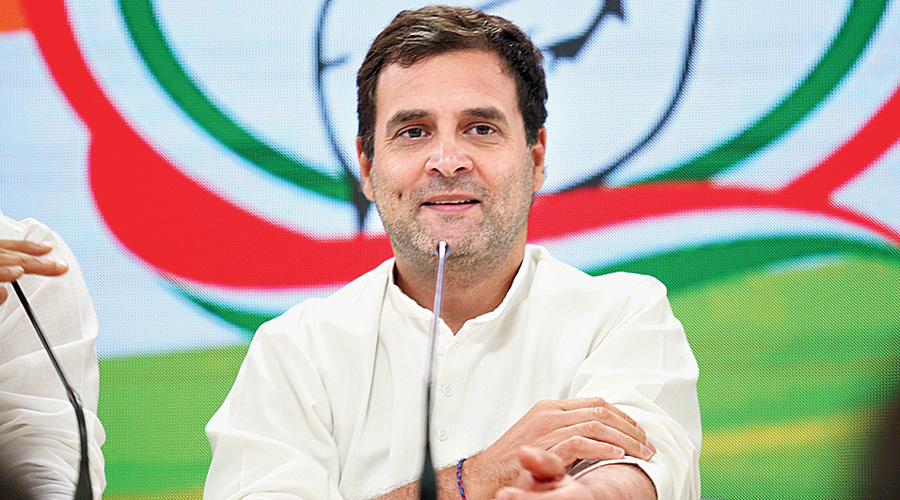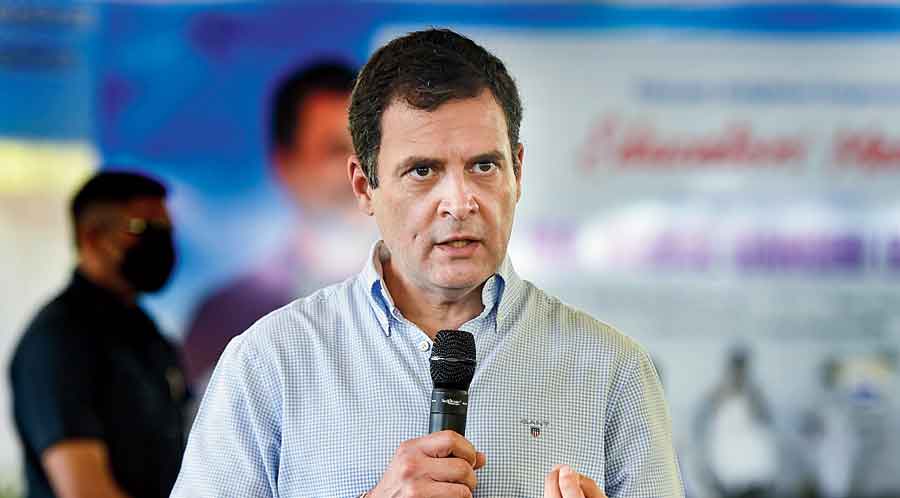Rahul Gandhi on Thursday argued that calling the RSS and its allied outfits “Sangh parivar” was not correct as they were devoid of family values, a critique that could be an attempt to bring the ideological infirmities of the BJP’s mentor into the mainstream discourse.
The Congress leader, who is intensely campaigning in election-bound states, tweeted: “I believe it is not correct to call RSS and allied outfits as Sangh Parivar. There are women in a family, there is respect for elders, a feeling of compassion and love — values absent in RSS. Now I won’t describe RSS as Sangh Parivar.”
Although Rahul has been one of the strongest critics of the RSS in contemporary politics and has pointed to the absence of women in the outfit’s hierarchy several times in the past, he has now offered a more comprehensive analysis by referring to the perceived lack of compassion and love, apart from respect for elders.
Although most RSS office-bearers are elderly people, Rahul might have been pointing to the humiliation of senior leaders such as L.K. Advani, Murli Manohar Joshi, Sumitra Mahajan, Kalraj Mishra and Yashwant Sinha in the garb of an age limit of 75 for participating in active politics.
The 75-plus rule may sound farcical now that the BJP has lapped up 88-year-old veteran technocrat E. Sreedharan to reap electoral benefits in Kerala while the 80-year-old Najma Heptulla continues to be governor of Manipur.
While women are not allowed in the RSS, there is a separate nondescript outfit called Rashtriya Sevika Samithi that enrols women activists. But the RSS is not for advocacy of women’s empowerment and even the current chief, Mohan Bhagwat, has attracted criticism by arguing that women’s primary duty is to look after the home and keep the husband happy.
Rahul’s reference to compassion and love appears linked to the divisive agenda against minorities and intolerance of pluralism that he ceaselessly dwells on. His new articulation, which strikes at the nomenclature of the ideological fraternity called the Sangh parivar, is bound to trigger a larger debate through which the Congress leader seeks to expose the biases of the so-called cultural organisation.
Even in states like Tamil Nadu, Kerala and Assam, Rahul has talked about the infirmities in the RSS ideology in the context of women’s empowerment and rejection of a pluralist culture.
On Wednesday, Rahul had commented on the harassment of Kerala nuns by members of RSS student wing ABVP in Uttar Pradesh. He had tweeted: “The attack in UP on nuns from Kerala is a result of the vicious propaganda run by the Sangh Parivar to pitch one community against another and trample the minorities. Time for us as a nation to introspect and take corrective steps to defeat such divisive forces.”
While the ideological battle is old and eternal, even the political conflicts have intensified in the aftermath of the ongoing farmers’ movement and the allegations of attempts to undermine democratic institutions.
The Congress on Thursday strongly objected to the curtailment of the budget session of Parliament, which was adjourned sine die two weeks before the scheduled closure.
The Congress chief whip in the Rajya Sabha, Jairam Ramesh, said: “The government said there were demands from regional parties because of Assembly elections. There were no such demands; the demand came from the South Block and the North Block (offices of the Prime Minister and the home minister).”
Both Prime Minister Narendra Modi and home minister Amit Shah, in addition to many central ministers, are busy with election campaign.
The leader of the Opposition in the Rajya Sabha, Mallikarjun Kharge, said: “The Prime Minister has no interest in Parliament. There is no need to call a session if the burning issues are not to be discussed.”
Ramesh said: “The government is undermining every democratic institution. In this session, the Opposition’s demands were steamrolled. Not even one calling attention motion or short duration discussion was allowed. We wanted debates on the farmers’ movement, the privatisation of national assets, etc, but nothing was allowed. Democracy is not strengthened by new buildings; democracy is strengthened by allowing institutions to function properly.”
Giving examples of the government’s undemocratic instincts, Ramesh said: “The National Bank for Financing Infrastructure & Development Bill was passed today. This is a new experiment as this government institution will not be probed by the CAG, CBI, the CVC and even Parliament’s Public Accounts Committee. Why no oversight is allowed?”
He threatened to move the Supreme Court against unlawful legislation, including the new laws on mining and the Delhi government’s powers, indicating an escalation of the political fight in the coming months.












